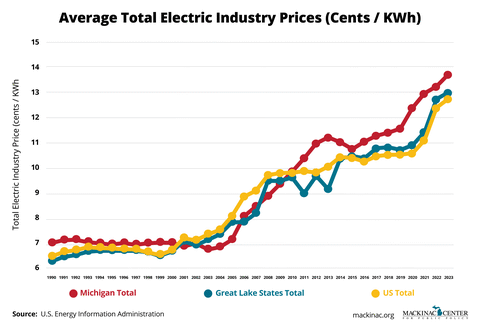Michigan’s electricity is among of the most expensive and least reliable in the country, and ratepayers have no option to take their business elsewhere. The monopoly over electricity sales that investor-owned utilities are given by the state is a key reason for this sorry state of affairs.
Consumers Energy, DTE, Upper Peninsula Power Company, and Indiana Michigan Power Company are just a few of the electric utilities that enjoy insulation from market competition. State-granted monopoly power allows them to charge rates as high as the Michigan Public Service Commission will allow.
Their monopoly is limited to 90% of the market, allowing the remaining consumers to choose from a selection of alternative suppliers. The results speak for themselves; the waiting list to get into this market has more customers in it than the market itself.
It doesn’t have to be this way.
From 2002 to 2008, Michigan enjoyed electricity choice; purchasers of electricity were true customers, selecting from a variety of electricity generators in a comparatively free market. Prices in Michigan were lower during most of that period than prices in other states in the Great Lakes region, and in the country as a whole.
However, opponents of electricity choice argued that electricity utilities were natural monopolies, that they benefited from economies of scale. Having many smaller utilities would create redundancies and inefficiencies, goes the argument.
Of course, the same arguments were used against telecommunications services, yet people choosing their internet and cell phone service providers have ever-improving quality and pricing to show for it. Meanwhile, a quick glance at worsening utility bills makes the pro-monopoly argument hard to maintain.
Aside from such examples, state-backed monopolies create deeper incentive problems.
Because the monopolies are regulated by the state but still need to generate profits to reinvest into their business and give to their many investors, the Michigan Public Service Commission gives monopoly utilities a guaranteed return on equity of around 10%. This means that the more expensive specific projects are, the more guaranteed profit the monopoly utilities can make. As a result, they push for expensive projects to farm their guaranteed rate of return, and they are willing to do so at the cost of reliability. The push for wind and solar power is cheered on by major monopoly utilities not because it’s price-efficient, as other proponents claim, but rather the opposite: The utilities support electric decarbonization policies precisely because they are expensive. (This push for net-zero carbon dioxide emissions is both costly and highly harmful for reliability.)
Ratepayers will receive no help from the regulators either, because they too are pushing for costly decarbonization schemes — though usually for ideological reasons rather than market incentives.
The choice of the term “ratepayer” on my part is intentional; those living under monopoly utilities are not customers. They have no choice from whom to give their business. They pay a rate, and that is all they are allowed to do.
Electricity choice changes this.
While electricity markets are far from free, customers in a freer market still benefit from the competition that monopolies are protected from. Electricity in Michigan is mostly up to the monopoly utilities, but natural gas markets have choice, and multiple suppliers have lower rates than the big utilities. As a result, customers are better off.
Furthermore, electricity choice allows the market dynamism that comes from competition; any innovations that might have revitalized the century-old grid system are stymied by heavily regulated monopoly stagnation.
But fundamentally, this country was built upon ideas of freedom. Such regulated monopolies have existed for a long time, but that shouldn’t change how alien they truly are to a nation dedicated to liberty. Technocratic regulators work with behemoth utility corporations to force ratepayers to take what they’re given. What they’re given is more expensive and less reliable than elsewhere. Competitive markets would be better. And more American.












